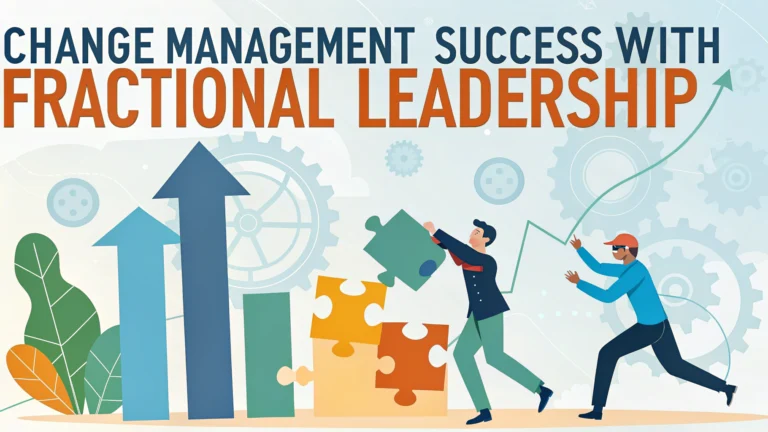Change management requires skilled leadership to guide organizations through transitions while maintaining productivity and employee engagement.
Fractional leadership offers a flexible solution for companies seeking experienced change management expertise without the commitment of a full-time executive.
A fractional COO can provide the strategic oversight and implementation know-how to navigate complex organizational changes effectively.
Key Benefits of Fractional Leadership in Change Management
- Objective third-party perspective on organizational challenges
- Cost-effective access to executive-level expertise
- Flexible engagement terms based on project needs
- Rapid implementation of best practices
- Reduced risk through experienced guidance
Common Change Management Scenarios
Digital transformation projects often require specialized leadership to maintain operations while implementing new systems.
Restructuring initiatives benefit from experienced oversight to minimize disruption and maintain morale.
Merger and acquisition integration demands careful planning and execution to align different organizational cultures.
Implementation Strategy
- Assessment Phase
- Current state analysis
- Stakeholder mapping
- Risk evaluation
- Planning Phase
- Goal setting
- Timeline development
- Resource allocation
- Execution Phase
- Communication strategy
- Training programs
- Progress monitoring
Measuring Success
| Metric | Description |
|---|---|
| Employee Adoption Rate | Percentage of staff actively using new systems or processes |
| Productivity Metrics | Comparison of efficiency before and after changes |
| ROI Analysis | Financial impact of implemented changes |
Best Practices for Success
- Clear communication channels between fractional leadership and internal teams
- Regular progress updates to stakeholders
- Documented processes and procedures
- Defined success metrics and milestones
- Continuous feedback loops for adjustment
Finding the Right Fractional COO
Look for candidates with proven change management experience in your industry.
Verify their track record of successful implementations similar to your project scope.
Ensure cultural fit and communication style alignment with your organization.
Contact professional networks like COO Society or CEOx for vetted fractional executives.
Moving Forward with Confidence
Successful change management through fractional leadership combines expert guidance with flexible engagement models.
Regular assessment and adjustment of implementation strategies ensure optimal outcomes.
Organizations can contact fractional leadership providers through platforms like LinkedIn or professional COO networks to begin their transformation journey.
Change Management Tools and Technologies
Modern change management requires robust digital tools to track progress and maintain accountability.
Project management software enables real-time collaboration and milestone tracking across teams.
- Change management dashboards
- Communication platforms
- Progress tracking tools
- Analytics software
Risk Mitigation Strategies
Common Risks
- Employee resistance
- Technical complications
- Budget overruns
- Timeline delays
Mitigation Approaches
- Comprehensive training programs
- Regular stakeholder updates
- Contingency planning
- Performance monitoring
Building Internal Change Capacity
Fractional leaders should focus on developing internal capabilities for long-term sustainability.
Knowledge transfer ensures organizations can maintain momentum after the engagement ends.
- Leadership development programs
- Process documentation
- Training materials
- Best practice guides
Embracing Transformational Leadership
Change management success depends on combining experienced fractional leadership with internal commitment to transformation.
Organizations that embrace this hybrid approach position themselves for sustainable growth and adaptability.
Ready to begin your transformation journey? Connect with qualified fractional leaders to drive your change initiatives forward.
FAQs
1. What is the role of a fractional COO in change management?
A fractional COO provides part-time executive leadership to guide organizations through transformational changes, implementing strategic initiatives while managing costs effectively compared to a full-time COO.
2. How does fractional leadership support successful change management?
Fractional leadership brings experienced executives who have managed multiple change initiatives across different organizations, offering proven methodologies and objective perspectives without the long-term commitment and cost of permanent hires.
3. What are the key benefits of using a fractional COO for change management?
The benefits include access to senior-level expertise at reduced costs, faster implementation of change initiatives, objective third-party perspectives, and the ability to scale leadership resources based on project needs.
4. How long does a typical change management engagement with a fractional COO last?
Engagements typically range from 3 to 18 months, depending on the scope of change, organizational size, and complexity of the transformation needed.
5. What metrics indicate successful change management under fractional leadership?
Success metrics include employee adoption rates, implementation timeline adherence, ROI on change initiatives, reduction in resistance to change, and achievement of specific organizational goals.
6. How do fractional COOs handle resistance to change within organizations?
They address resistance through strategic communication plans, stakeholder engagement, creating clear vision statements, establishing feedback channels, and implementing training programs to support the transition.
7. What qualifications should organizations look for in a fractional COO for change management?
Look for proven track record in change management, relevant industry experience, strong leadership skills, certification in change management methodologies, and demonstrated success in similar-sized organizations.
8. How does a fractional COO ensure continuity after their engagement ends?
They develop detailed documentation, establish sustainable processes, train internal teams, create transition plans, and often provide post-engagement support to ensure changes remain effective.
9. What is the typical cost structure for engaging a fractional COO?
Costs are usually based on daily or hourly rates, with flexible arrangements that can include retainer agreements, project-based pricing, or hybrid models, typically ranging from 30-60% less than a full-time COO.
10. How do fractional COOs integrate with existing leadership teams?
They work collaboratively with existing executives, establish clear roles and responsibilities, maintain regular communication channels, and focus on complementing rather than competing with internal leadership.







